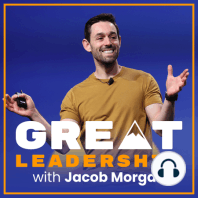74 min listen

How Leaders Can Get the Best from Their People
How Leaders Can Get the Best from Their People
ratings:
Length:
66 minutes
Released:
Jun 15, 2020
Format:
Podcast episode
Description
Liz Wiseman is a New York Times bestselling author of three books, including Multipliers: How the Best Leaders Make Everyone Smarter. She has been listed on the Thinkers50 ranking and in 2019 she was recognized as the top leadership thinker in the world. She is a researcher, an executive advisor, and the CEO of the Wiseman Group, a leadership research and development firm. Some of her recent clients include Apple, Disney, Tesla, Facebook, and Twitter. Previously, she was the Vice President of Oracle University and the global leader for Human Resource Development at Oracle Corporation. She frequently guest lectures at BYU and Stanford University. In Liz’s book, Multipliers, she describes two types of leaders that we have all encountered--diminishers and multipliers. As Liz says, organizations cannot afford to have leaders who are diminishers. The good news is multiplier leadership can be learned and developed. Diminishing leaders vs. multiplier leaders Liz gives a great metaphor for these two types of leaders. Diminishers tend to keep people on choke chains while multipliers let people off the leash, but they still hold on. It’s as though the employees are kites allowed to soar while the leader is still hanging on to the kite strings. It’s not that diminishers are necessarily horrible people trying to control everything. As Liz shares, “Some of it comes from that micromanaging bully, narcissistic boss who, you know, gives you a little task to do rather than challenges and opportunities. But most of it's coming from what I call the accidental diminisher. And these are leaders who care about their people, want to be good leaders trying to do the right thing. Like in my case with Ben, I was just excited to be collaborating with him. Where I needed to say, this is yours let me back away. Hold the strings of the kite rather than suffocate you because of my enthusiasm.” The multiplier effect As Liz researched for her book she interviewed well-respected professionals and after asking them to identify some multiplier leaders they had worked for she asked them what percentage of their capability those leaders had been able to get from them. On average it was 95%, however she found that a lot of people gave answers of over 100%. At first she challenged that, saying your intelligence and capability is always capped at 100%, it’s not possible to be over that. But these individuals said that the leaders were able to not only get 100% of their ability, but they stretched them and caused them to become smarter over time. Liz says, “We know this, that intelligence. It languishes. It shrinks essentially when it's not used. And when intelligence is challenged and used and applied, it grows. We literally get smarter and more capable around certain kinds of leaders and people and colleagues and roommates and family members. And that is really the multiplier effect. It's getting all of people's capability plus a growth dividend. And then the dynamic that happens across an organization where people come to work knowing that not only are they going to be fully utilized, they're going to be challenged. That you need to show up, game ready. That's the multiplier effect.” The five disciplines of multipliers For the book, Liz analyzed data on over 150 leaders and she found several areas where multipliers and diminishers act similarly including customer service and market insight. But she found five active ingredients unique to multipliers. They are: The Talent Magnet: They attract and optimize talent to its fullest. They get the best out of everyone, regardless of if the people report directly to them or not The Liberator: They require people’s best thinking. They create an atmosphere that is both comfortable and intense. The Challenger: They extend challenges. They lay down challenges that stretch, but they also generate the belief that it can be done The Debate Maker: They debate decisions. By allowing people to debate decisions early on they
Released:
Jun 15, 2020
Format:
Podcast episode
Titles in the series (100)
Seth Godin On Marketing Yourself: What Promises Are You Making And Can You Live Up To Them?: With returning guest, bestselling author, speaker and founder of altMBA, Seth Godin by Great Leadership With Jacob Morgan